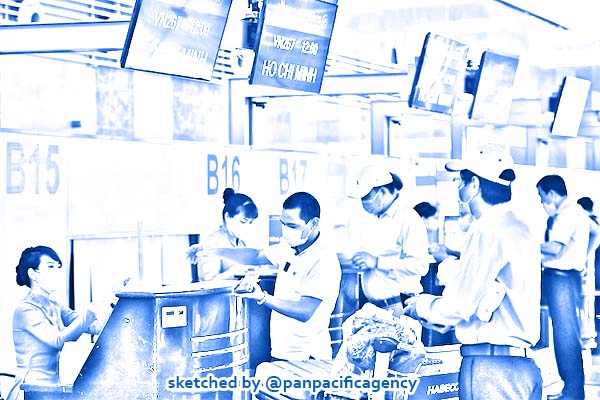Japan to loosen border enforcement measures to allow in new arrivals

Vietnam will study the reopening of commercial routes between Vietnam and Japan, South Korea. Photo: Vietnam Airlines. Photo: Hanoi Times. Sketched by the Pan Pacific Agency.
TOKYO, Sep 23, 2020, The Japan Times. Speculation is rife that, in a long-awaited move, Japan is readying to relax its strict entry restrictions on foreign nationals to allow more new visa applicants to seek entry clearance, The Japan Times reported.
Citing several government sources, several nationwide media outlets reported Wednesday that in as early as October the country will start allowing entry for residents with permission to stay more than three months and international students, regardless of where they come from. However, the planned change will not cover tourists.
Under the current travel restrictions, which have been met with harsh criticism from Japan’s foreign community and international business groups, travelers from 159 countries and regions have been denied entry in principle. From September, Japan has been allowing its foreign residents to seek re-entry permission without strict preconditions, albeit under strict entry procedures. However, entry permission for new arrivals has been granted only in limited situations.
According to the government officials quoted in the reports, Japan is planning to expand the scope of areas subject to relaxed entry restrictions and further loosen restrictions for travelers from 16 countries, mainly in Asia, where the pandemic is deemed to be relatively under control.
Over the past few months, Japan has conducted negotiations toward resuming business travel with 16 countries, including Australia, China, Malaysia, Myanmar, New Zealand, Singapore and South Korea.
So far, Japan has resumed business travel with countries including Thailand and Vietnam and has resumed short-term business travel with Singapore. In September, Japan also eased restrictions for travelers from Taiwan, Malaysia, Cambodia, Laos and Myanmar, allowing long-term residents, such as expatriate workers, to travel back and forth between Japan and those regions.
On Wednesday, government officials quoted in the media reports said the changes will allow foreign nationals from other regions to travel to Japan to engage in cultural activities, provide medical services or carry out educational activities. The government is also moving toward relaxing entry restrictions for privately financed international students.
During his regular news conference Wednesday, Chief Cabinet Secretary Katsunobu Kato stressed that the government has so far taken steps to ease travel restrictions while making sure such moves wouldn’t result in a spike in coronavirus infections.
“We will continue to earnestly consider the optimal ways to resume travel including allowing in new (foreign) arrivals while preventing an increase in coronavirus infections,” Kato said. “Nonetheless, in our further decisions we will take into consideration the (COVID-19) situation.”
According to an Asahi Shimbun report, following the changes to the existing travel restrictions, Japan is aiming to accept up to 1,600 international arrivals per day from the 16 countries with fewer infections, while allowing up to 1,000 arrivals daily from other regions. These limitations do not apply to Japanese nationals.
The entry restrictions, which were introduced April 3 as temporary measures aimed at curbing the spread of the virus into Japan and have since been updated throughout the pandemic, left thousands of people residing in Japan unable to travel. They have also left in limbo thousands of people seeking entry under new visas as related proceedings have been halted since April.
Kato did not specify when exactly the restrictions will be loosened and did not elaborate on eligibility for entry.
The proposed changes, however, will likely be delayed for regions with higher numbers of infections, and government arrangements, which require coordination between ministries overseeing the procedures, may also stall the process.
Even though earlier in September the government relaxed travel restrictions for foreign nationals already residing in Japan, the revision sparked concerns that even legal residents may face deportation upon their return due to unclear and strict requirements that differ from those applied to residents with Japanese passports.
Upon arrival, all foreign nationals traveling to Japan are required to undergo coronavirus testing and observe a 14-day quarantine period. From September, all foreign travelers, including those with a legal residence status, are also required to submit proof they were tested for COVID-19 within 72 hours prior to their departure for Japan.
With increased international travel, the government aims to secure a daily testing capacity at international airports of about 20,000 per day from November.